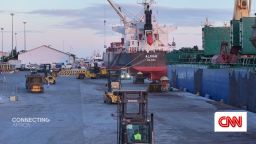China’s Evergrande Group — once the country’s second-largest property developer — filed for bankruptcy in New York on Thursday.
The beleaguered firm borrowed heavily and defaulted on its debt in 2021, sparking a massive property crisis in China’s economy, which continues to feel the effects.
Evergrande filed for Chapter 15 bankruptcy protection, which allows a US bankruptcy court to step in when an insolvency case involves another country. Chapter 15 bankruptcy is intended to help promote cooperation between US courts, debtors, and other countries’ courts involved in cross-border bankruptcy proceedings.
Evergrande did not immediately respond to CNN’s request for comment.
The impact of Evergrande’s default
China’s real estate sector was long seen as a vital growth engine in the world’s second-largest economy and accounted for as much as 30% of the country’s GDP. But Evergrande’s 2021 default sent shockwaves through China’s property markets, damaging homeowners and the broader financial system in the country.
The company’s default came after Beijing began cracking down on excessive borrowing by developers in an attempt to rein in soaring housing prices.
Since Evergrande’s collapse, several other major developers in China, including Kasia, Fantasia, and Shimao Group, have defaulted on their debts. Most recently, another Chinese real estate giant, Country Garden, warned that it would “consider adopting various debt management measures” — fueling speculation that the company may be preparing to restructure its debt as it struggles to raise cash.
The industry’s problems have been amplified by an overall economic slowdown in the country.
A comeback plan?
Evergrande is a massive company with more than 1,300 real estate projects in more than 280 cities, according to its website. The company also has several non-real estate businesses, including an electric vehicle business, a health care business, and a theme park business.
Evergrande has struggled to pay off its loans after officially defaulting on its debt in late-2021. The property company’s debt load reached 2.437 trillion yuan ($340 billion) by the end of last year. That is roughly 2% of China’s entire gross domestic product.
Evergrande also reported in a stock market filing last month that it had lost $81 billion of shareholder money in 2021 and 2022.
Earlier this year, the company unveiled its long-awaited debt restructung plan, which was China’s largest on record. The developer said it had reached “binding agreements” with its international bondholders on the key terms of the plan.
“The proposed restructuring will alleviate the company’s pressure of offshore indebtedness and facilitate the company’s efforts to resume operations and resolve issues on shore,” Evergrande said in a filing announcing the plan.
As part of the plan, Evergrande said it would focus on returning to normal operations in the next three years, but it would require additional financing of $36.4 billion to $43.7 billion. The company also warned that its electric vehicle unit was at risk of shutting down without new funding.
SInce then, some funding has come through. Earlier this week, Dubai-based automobile company NWTN, announced a $500 million strategic investment in Evergrande’s EV group in exchange for a stake of about 28%.




